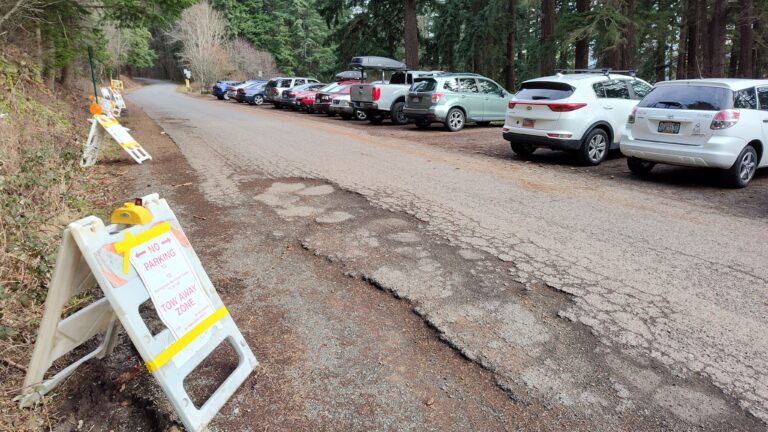Editor,
There was a time within living memory when the Skagit Valley tulip fields were a sight to behold yet blessedly little-known. Around 1980 one could drive their vintage auto or truck along McLean Road from La Conner to Mount Vernon at the height of tulip season and meet little traffic. Though by the late ’70s, the tourists had discovered First Street in La Conner — out in the countryside the roads were blissfully uncongested.
Now jump ahead 43 years. Besides glutted roadways and parking lots and blocked driveways, add the overhead intrusion of noisome helicopters, for those who prefer to gape at the fields airborne, “far from the madding crowd.” What might be the next innovation? How about cow-cuddling aboard helicopters? To vicariously experience farm life without risk of muddying one’s shoes.
A more-level idea? Run special passenger trains from both Seattle and Vancouver, British Columbia. The tracks to both metropolises are owned and controlled by BNSF Railway — as is the branch line extending westward from Burlington. Park the trains on the tracks that parallel Highway 20, and offload the passengers onto buses to the tulip fields — easing traffic not only on local roads, but on Interstate 5 and streets in downtown Mount Vernon.
Of course, the railroad company might balk at the interference of running its oil trains out to March Point. How to sell the idea to BNSF management? Bill it as a way for the railroad giant to make amends for a predecessor company laying track across Swinomish Tribal land without permission, back in 1891. And for violating later agreements regarding the frequency and length of freight trains crossing the reservation. And for countering the negative publicity following the recent derailment at the Swinomish Channel bridge approach. Which could’ve been a whole lot worse.
Paul Kenna
Bellingham
Editor,
In your Business Matters article entitled “Whatcom-B.C. personal vehicle traffic remains below pre-pandemic levels” (CDN, April 5), the reporter, citing border statistics that cross-border traffic is 60% of pre-pandemic normal, poses the question, “Where are all the Canadians?”
Indeed, he notes the Whatcom Council of Governments official statistics are cause for “… if not concern, puzzlement“ and … the “‘why’ behind the lower personal traffic is still a mystery.” But this well-researched article, while raising lots of questions and speculation as to the much-lowered numbers of our Canadian neighbors, doesn’t proffer an answer to the question of why the lowered numbers.
May I take a shot at it? How about because they no longer want to come here?
Mass shootings in the U.S. are now almost a weekly occurrence. Graffiti, tent encampments, litter, homelessness and emboldened panhandlers do not make for a welcoming country. One Canadian said that for him, the crazy Trump presidency years made it seem like Canada was the fearful neighbor living above a meth house.
I am typing this letter as I sit on the Amtrak cross-border train, returning from a delightful day’s shopping in Vancouver. I felt safe and welcomed to a very clean city that has a government and country that is not overwhelmed by gun violence. Puzzled by why Canadians aren’t down here spending their money? I’m not.
Bruce Vilders
Mount Vernon
Editor,
CDN’s Frank Catalano speculates on why Whatcom-B.C. personal vehicle traffic remains below pre-pandemic levels. One possible reason given is shoppers have changed their habits.
There could be an additional reason that few people want to consider.
According to Pew Research Center: There were 45,222 total gun deaths in the U.S. in 2020, by far the most on record, representing a 14% increase from the year before, a 25% increase from five years earlier and a 43% increase from a decade prior.
Gun murders, in particular, have climbed sharply in recent years in the U.S. The 19,384 gun murders that took place in 2020 were the most since at least 1968, exceeding the previous peak of 18,253 recorded by the Centers for Disease Control and Prevention in 1993. The 2020 total represented a 34% increase from the year before, a 49% increase over five years and a 75% increase over 10 years.
In 2020, a total of 278 victims died of gun homicides in Canada.
Micki Jackson
Bellingham
Editor,
Extremely pleased to see and read the two profiles of the Northwest Indian College athletes. The smaller institutions are left completely off the sports pages everywhere else. Malachi Rogers (CDN, April 11) and Sara Wolgemuth (CDN, April 7) are typical of the many athletes toiling in small schools without any of the accolades and notoriety given to those in larger institutions or even in high schools.
Excellent reporting exemplifying the best in sports journalism going beyond the usual to provide insight into the unique aspects of these fine athletes far from their native homes.
Richard Morgan
Bellingham
Editor,
The Bellingham City Council just passed an ordinance that added “the threat of jail” as a “tool” for making the city safer. They have now criminalized being houseless. Incarcerating people for addictions and homelessness is not a solution, and it will make no one safer. I also learned that the city is seeking to add another four officers to the police force. I cannot say how disappointed I am that the people elected by citizens of our city and county cannot find resources to find another way.
Imagine being awakened from your sleep by a person hefting 50 pounds of lethal force and threatened with jail if you don’t get up off your bed. Incarceration is an easy way to solve a “problem” without solving it and actually making the “problem” worse. If there are resources to take these actions, there are resources for other types of interventions.
Hire four new mental health or social workers instead of hiring four new police officers. Consult with the folks running homeless shelters for another way forward. Build more transitional tiny home communities such as Gardenview Village. Provide a space for an encampment and staff it with trash bins, toilets and helpers.
Invite those upset business owners to join a conversation about alternatives.
We can do better for those who are in great need because of homelessness or addiction, for our local businesses, and for the folks who shop in and walk the streets of Bellingham. We certainly do not need to increase the number of incarcerated folks because local businesses want them out of sight.
Ronna Loerch
Everson
Editor,
Since landing in Bellingham in 2003, we’ve seen significant deterioration in the downtown area. Most trips now are just to visit one of the local breweries. Venture into the core and you’re exposed to an unsavory element that has been let to grow over time.
Mayor Seth Fleetwood should be commended for taking ownership of the problem of public drug use downtown. The resultant new ordinance is a baby step necessary to slow the rate of decay of the downtown area.
It’s disappointing that the council only took action after the mayor forced the issue. His action compelled some of the various council members to get involved. A long overdue survey by the Downtown Bellingham Partnership was also undertaken. Included in the findings was that 22 of 53 shops planned to move or close, almost 50%. This is very significant.
I’ve occasionally poked fun at the mayor in recent letters to Cascadia Daily News.
But, to his credit, the mayor, in his tenure, has had to step into civic fires more than once, forced to take corrective action or manage a “big city” issue that put the well-being of the city before politics.
Examples that easily come to mind would be the “Occupy City Hall” demonstration and the Post Point revamp debacle.
His leadership, with the support of the Bellingham Police Department, brought the demonstration and illegal camping to a soft-landing conclusion. The approach that was used helped minimize injury and property damage during the demonstration.
His action on the Post Point project saved the citizens of Bellingham from a billion-dollar train wreck.
So, let’s hope that firstly, the ban on open-use ordinance will send a message to the addicts that the behavior will no longer be tolerated in the town.
Secondly, it is hoped that the ordinance will add continued momentum to the expansion of available resources for those addicts who are seeking relief from chemical dependence.
Bob Morton
Bellingham
Editor,
On Tuesday evening, April 11, citizen after citizen addressed Whatcom County Council, pleading with them to send a letter to Washington Department of Natural Resources (DNR) requesting a pause on the Brokedown Palace timber sale. Instead, due to doubt regarding payments to beneficiaries, the council decided to delay the letter, which DNR seems to have seen as a green light. Two days later, it filed to have Brokedown Palace put up for auction.
The arguments made were convincing enough. Brokedown Palace comprises rare, naturally regenerated, lowland forest habitat, while at the same time holding together a steep slope above where the Middle Fork Nooksack River dam was recently removed to help revive critically endangered salmon runs. Numerous citizen, local, state, federal and tribal agencies worked to make the dam removal happen — and citizens are wondering how such collective will can be so easily counteracted by a single agency: DNR.
The key here is the word “legacy.” Though Brokedown Palace was cut long ago, it wasn’t sprayed and replanted, leaving the land’s original biotic complexity, thousands of years in the making, still intact. The trees were taken yet the forest grew back. But DNR doesn’t just cut trees, it typically sprays and replants the land as timber plantation. Not only are the trees taken but the forest is destroyed, converted to industrial plantation.
Legacy has another meaning, which points to us, the electorate and the elected. What will our legacy be? We are the ones who find ourselves with this responsibility, and it’s clear that without our firm opposition, these sacred places will be lost forever.
This community has shown before what it’s capable of in defending what it loves. For the sake of these irreplaceable forests, we need to find that spirit and gumption once again.
Rob Lewis
Bow



Commentary response: Nursing-home staffing mandates critical to dignified care